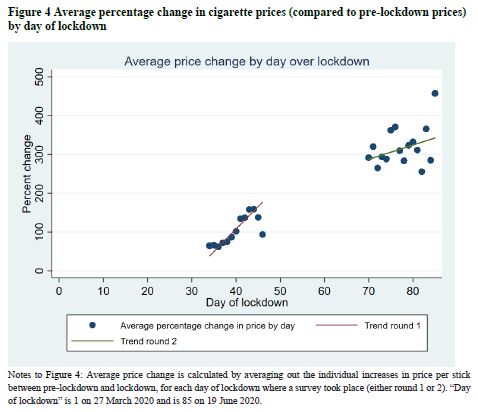"Smoking and Quitting Behaviour in Lockdown South Africa": Results from a second survey
On 21 July 2020, REEP published a report entitled “Smoking and Quitting Behaviour in Lockdown South Africa: Results from a second survey”. This report follows on from our first report entitled “Lighting up the illicit cigarette market: Smokers’ responses to the cigarette sales ban in South Africa”, which was published on 15 May 2020.
This second report is based on the results of an online survey, conducted between 4 June and 19 June 2020. The survey was completed by more than 23 300 respondents. The survey was advertised on three major platforms, Twitter, Change.org and the Moya app. The Moya app is a local, data-free service that caters to the poorer segments of society.

The single most important reason for wanting to quit smoking during lockdown has been the high price of cigarettes (56%). Our analysis found that prices had increased by an average of 250% compared to the pre-lockdown period. Other factors such as the unavailability of cigarettes (14%), the ban on the sale of cigarettes (11%), health concerns (9%), not wanting to be addicted to cigarettes (5%), and pressure from family and friends (1.3%) were relatively unimportant in the decision to quit smoking during lockdown. Most of the respondents who quit smoking, did so in the first six weeks of the lockdown.
In some provinces, notably the Western Cape and Northern Cape, the price increases were substantially higher than average (more than 350%), while the price increases in Limpopo, Mpumalanga and Gauteng were less than average (between 120% and 160%).
Our results show that, despite the ban, the illicit market is thriving. We found that 93% of continuing smokers in our sample were able to buy cigarettes during the lockdown. Average cigarette consumption among continuing smokers decreased by about 20% from 16.4 cigarettes a day pre-lockdown to 13.1 cigarettes a day in the four weeks preceding the survey. Our results show that the market for cigarettes, which had previously been dominated by multinationals (MNCs), has now been captured by local companies and, to a lesser extent, by imported cigarettes. We predict that, once the sales ban is lifted, there will be a price war, in which the multinationals will aim to get some of their market share back and the non-MNC companies will aim to hold on to their markets. The resulting price decrease will be detrimental to public health.
Based on the fact that most respondents are continuing to smoke, that most respondents who have quit smoking did so during level 5 lockdown, that the government is losing more than R1 billion in excise taxes each month, and that the continued ban is entrenching an already large illicit market, we conclude that the extension of the ban beyond level 5 lockdown has been an error. We thus recommend that government lift the sales ban expeditiously and, introduce a substantial increase in the excise tax at the same time the sales ban is lifted. This should be followed by above inflationary increases in subsequent years. The increase in the excise tax will counteract the impact of a likely price war. Our report notes that this strategy would allow the National Treasury and the South African Revenue Services to claw back some of the revenue that they have lost during lockdown. Furthermore, it would encourage more smokers to quit, and incentivise many quitters (who may otherwise resume smoking when the price falls to its “normal” level) to stay non-smokers. This is especially important since it is high prices, rather than the sales ban, that led respondents to attempt quitting smoking in the first place.
Critics of such strategy to increase the excise tax substantially would argue that to do so would increase illicit trade. That may be possible, but at least illicit trade will not increase to 100%, as is currently the case under lockdown. There is ample evidence from other countries that, with political will and with the appropriate use of technology (such as digital tax stamps and an independent Track and Trace solution), illicit trade can be brought under control.
A variety of media outlets covered the report. For a sizeable, although not fully comprehensive list of media reporting on this report, see http://www.reep.uct.ac.za/news/reep-lockdown-study-2-covered-extensively-sa-media.
Read the report in full here.
